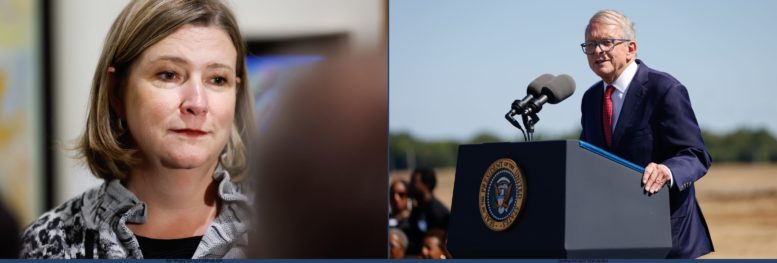After Gov. Mike DeWine finished his piece on how he’d help Ohio’s kids if re-elected, he quietly slipped out through a rear door without taking questions from the press.
An hour later Nan Whaley, his Democratic challenger, made a similar case, albeit a feistier one sharply critical of the incumbent, who she depicted as kowtowing to radicals in the General Assembly and being a “chicken” for refusing to participate in a candidates’ debate.
With just over a month until Election Day, stark contrast emerged between the two at a politics forum focused on children’s health issues hosted by Groundwork Ohio and other kids’ advocacy organizations.
DeWine listed highlights of his decades in office in the U.S. Senate, state attorney general and governor’s office, including spurring investments in children’s behavioral health programs and school services focused on the same. He didn’t mention his challenger by name, and broke from his usual practice of taking questions from state and local media.
Nan Whaley offers her ideas
Whaley offered similar investment ideas on stage, but faulted DeWine for signing a series of gun rights expansions, tax cuts that she said starve key programs of funding, and abortion restrictions. In an opening line on stage, she described DeWine’s proposal to remove a tax on baby products as hollow given Ohio’s restrictive abortion laws and how they recently forced a 10-year-old rape victim to leave the state to terminate a pregnancy.
“I don’t think you can talk about kids without talking about moms and the choices we’re going to have,” she said.
She also proposed closing a tax loophole used by passthrough entities — certain LLCs, partnerships, or S corporations — and using the proceeds to boost wages for child care workers. She said Ohio can’t count on consistently cutting taxes for the wealthy in the hopes it will “magically” spur the economic growth and tax revenue to fund expensive programs like schools, Medicare, Medicaid, and quality child care.
During the event, DeWine repeatedly cited investments through state budgets he signed in areas like foster care, subsidies for child care, millions to children’s hospitals, a program offering monthly free books to Ohio children, telehealth programs in rural schools, expanded testing for lead poisoning, and others.
“Investing in our children is the best recipe for a great Ohio,” he said.
DeWine has previously justified his refusal to debate by citing his long tenure in office and openness to questions from media. While polling has shown a vast majority of Ohioans want to see the candidates debate, they also show DeWine ahead of Whaley by huge margins, hinting at the political calculus.
A news release about the forum notes that the candidates will appear two hours apart and “will not be debating each other.” Whaley reiterated her offer to debate DeWine, calling his refusal a showing of disrespect to voters.
“I remember winning this primary by 32 points, and I still debated John Cranley a couple of times,” she said. “That’s what you do in a democracy. If you’re a governor, you have a responsibility to talk directly to people about why you deserve a second term.”
More headlines from Ohio Capital Journal:

